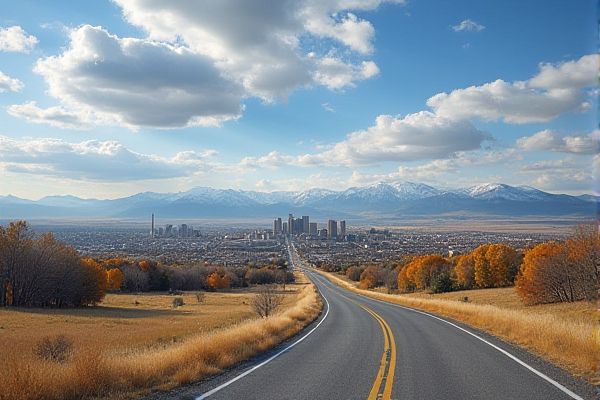
What to know as new resident in Wyoming: Wide-open spaces and low population density. Brutal winters and strong winds. No state income tax. High cost for remote housing. Wildlife commonly seen. Outdoor recreation opportunities. Cowboy and western culture. Limited public transportation. Fossil fuel-driven economy. Close-knit community atmosphere.
Wide-open spaces and low population density.
Wyoming is characterized by its wide-open spaces and low population density, with only six people per square mile, offering a peaceful and nature-centric lifestyle with minimal crowding and traffic jams. For more intriguing insights, feel free to visit Fun Facts About Wyoming to learn more about this unique state.
Brutal winters and strong winds.
As a new resident in Wyoming, be prepared for brutal winters characterized by long, cold days, significant snowfall, and strong winds that can make temperatures feel even colder due to wind chill. It is crucial to invest in warm clothing, snowblowers, and emergency supplies, and to adapt to indoor hobbies and safety measures to navigate the harsh winter conditions. For more detailed guidance on enduring these challenging climates, visit the comprehensive guide on Surviving a Wyoming Winter, which offers essential tips for managing the season's demands effectively.
No state income tax.
As a new resident in Wyoming, you won't have to pay any state income tax, including on personal income, capital gains, and interest. This simplifies your tax obligations, as you will only need to file federal tax returns. To understand how these tax policies could benefit you financially, you can visit the Wyoming Tax Calculator offered by SmartAsset, which provides tools to help calculate your potential savings and explore further economic advantages of living in the Equality State.
High cost for remote housing.
In Wyoming, housing costs can be high, especially in remote or desirable areas like Jackson Hole, where homes can cost millions of dollars. Even in other cities, housing prices vary significantly, with median home values ranging from $264,589 in Casper to $1,116,679 in Jackson, and median rents for a two-bedroom apartment ranging from $843 to $1,082 per month depending on the location.
Wildlife commonly seen.
As a new resident in Wyoming, you can expect to see a diverse range of wildlife, including elk, bison, mountain lions, wolves, grizzly bears, black bears, moose, deer, pronghorn antelope, and wild horses, with many of these species residing in national forests, parks, wilderness areas, and Wildlife Refuges.
Outdoor recreation opportunities.
Wyoming offers a diverse range of outdoor recreation opportunities, including fishing, hiking, mountain biking, snowmobiling, skiing, and wildlife viewing, with notable destinations such as Yellowstone National Park, Grand Teton National Park, and the Medicine Bow National Forest. Activities are available year-round, catering to various interests and skill levels, from family-friendly fly fishing trips to challenging mountain trails and snow sports. For more information on these exciting activities, visit the Wyoming Outdoor Recreation website.
Cowboy and western culture.
As a new resident in Wyoming, you should know that the state is deeply rooted in Cowboy Culture, characterized by a strong Code of the West, dude and guest ranches, rodeos, horseback riding, and authentic Western lodging, reflecting a lifestyle of respect for the land and community. To explore more about this captivating lifestyle, visit the official Travel Wyoming website, which offers insights into living and experiencing the genuine spirit of the West.
Limited public transportation.
In Wyoming, public transportation is limited, with no train service and Greyhound buses primarily serving major cities along interstates, making car rentals essential for practical travel, especially to remote areas and outdoor recreation sites. Local public bus services like Jackson's START Bus are available but are generally confined to larger towns and cities. To learn more about the transportation options and travel tips in the region, visit the IExplore website for comprehensive guides and advice.
Fossil fuel-driven economy.
Wyoming's economy is heavily driven by the extraction and production of fossil fuels, particularly coal, crude oil, and natural gas. The state produces twelve times more energy than it consumes, making it the third-biggest net energy supplier among the states, with Fossil Fuel Industries contributing significantly to the state's GDP, tax revenue, and employment.
Close-knit community atmosphere.
In Wyoming, cities such as Casper and Evanston offer new residents a unique and close-knit community atmosphere. This is characterized by a strong sense of belonging, vibrant community spirit, and numerous opportunities for social engagement and outdoor activities. For those considering a move, discovering the charm of Evanston is compelling as the demand for housing is high, reflecting its appeal as a welcoming gem. Similar benefits are found in Gillette, where new residents are attracted by low taxes, a high quality of life, community safety, and robust education systems. These communities make Wyoming an inviting place where new arrivals can easily find their place and quickly make friends.
